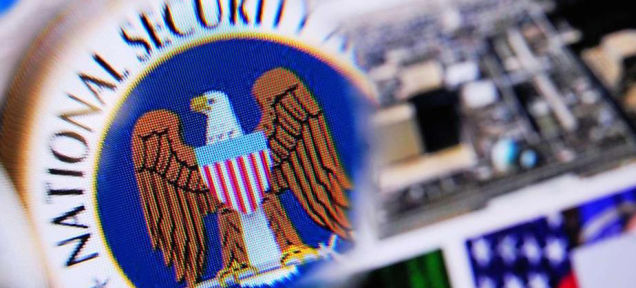The Washington Post just published a huge NSA investigation. The findings, sadly, are unsurprising, but the scope is massive: nine out of 10 messages intercepted by the NSA come from regular folks, not targets, and those private conversations and photos have been living in plain view on NSA databases. Just ’cause you’re a citizen doesn’t mean you’re safe.
How wide is the NSA’s net? The report indicates that the agency stretches the bounds of reason and logic in determining who counts as a “foreign target.” Write emails in a foreign language? Name show up on the chat buddy list of someone outside the U.S.? Use a proxy to watch World Cup coverage that doesn’t air in North America? Congratulations: the NSA considers you eligible for eavesdropping. The Post reports that the agency can claim the IP address of an entire server, accessed by hundreds of people, counts as a “target.”
The Post spent four months digging into a cache of 160,000 emails and instant messages given to them by Snowden, a trove of communications the NSA intercepted and saved to its databases between 2009 and 20102. Nearly half of those messages were marked by NSA analysts as belonging to U.S. citizens. The Post explains that many of those non-target messages contained some very private information:
Many other files, described as useless by the analysts but nonetheless retained, have a startlingly intimate, even voyeuristic quality. They tell stories of love and heartbreak, illicit sexual liaisons, mental-health crises, political and religious conversions, financial anxieties and disappointed hopes. The daily lives of more than 10,000 account holders who were not targeted are catalogued and recorded nevertheless.
The Post describes messages including medical records, resumes, children’s school records, even family photos, all belonging to people the NSA has no interest in tracking — but all saved to the NSA’s databases.
Scores of pictures show infants and toddlers in bathtubs, on swings, sprawled on their backs and kissed by their mothers. In some photos, men show off their physiques. In others, women model lingerie, leaning suggestively into a webcam or striking risque poses in shorts and bikini tops.
Legally, the NSA should only be able to target foreign nationals located outside the U.S. Intercepting messages from U.S. citizens should require a warrant from a special surveillance court. But the agency casts a very wide net, and the vast majority of people caught in the agency’s searches aren’t in any way considered targets.
But while other U.S. spy agencies follow strict guidelines to discard, say, wiretapped phone calls made by a suspect’s spouse or child, the data Snowden gave to The Post indicates the NSA follows no such ruling.
While the NSA has previously claimed it can’t estimate how many U.S. citizens get caught in its surveillance web, The Post says “t is not obvious why the NSA could not offer at least a partial count, given that its analysts routinely pick out ‘U.S. persons’ and mask their identities, in most cases, before distributing intelligence reports.”
Based on the spying community’s June 26th transparency report, The Post estimates that nearly 900,000 individuals have been subject to NSA snooping — whether or not they count as a legitimate target.
The full report is extensive and damning, but The Post even-handedly points out that the data collection has revealed some important info for our nation’s security:
Among the most valuable contents — which The Post will not describe in detail, to avoid interfering with ongoing operations — are fresh revelations about a secret overseas nuclear project, double-dealing by an ostensible ally, a military calamity that befell an unfriendly power, and the identities of aggressive intruders into U.S. computer networks.
Snowden, however, tells The Post that these successes don’t justify the unfettered snooping into innocent bystanders’ lives, or the long-term storing of their private data in NSA lockers.
Even if one could conceivably justify the initial, inadvertent interception of baby pictures and love letters of innocent bystanders,” he added, “their continued storage in government databases is both troubling and dangerous. Who knows how that information will be used in the future?
Ever since we first found out about the NSA, most folks have suspected that at some level ordinary folks were being snooped on. The Post’s confirmation of that fact is not terribly surprising. But the revelation that nine out of ten of those messages are irrelevant, and that the NSA is hoarding those messages seemingly indefinitely, adds a whole new ominous layer to the discussion.
The NSA, it seems, is like a digital elephant: its ears are huge, and it never forgets, even when it’s overhearing innocent bystanders. [The Washington Post]
